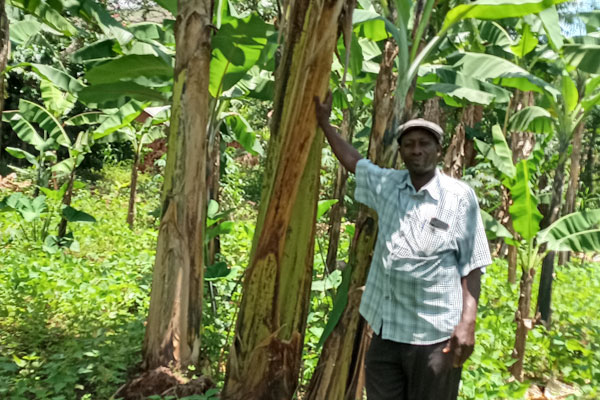Prime
Ntairaho turns to banana farming

Ntairaho explains how he plants the Vitamin A rich banana.Photo/Lominda Afedraru
What you need to know:
- He is practising mixed farming where he intercrops beans with banana and once the beans are harvested he plants other crops such as ground nuts which mature faster.
A s maize fortunes in Hoima District started to dwindle years ago, some farmers turned to alternative crops.
The area, like others across the country, has experienced long spells of drought in the past and the maize necrotic disease, which ruined many maize growers.
Johnson Agondezi Ntairaho, 48, from of Bulindi Kigungu in Hoima District, is among farmers who switched from maize after making consistent losses.
“I was disappointed about maize growing because of the losses I made, which forced me to embrace other crops since I did not want to go back to it,” says Ntairaho.
Banana farming
When Seeds of Gold arrive at Ntairaho’s farm, we find him pruning and weeding his banana plantation. On his farm, Ntairaho grows both local bananas and the new variety from Naro which is rich in Vitamin A.
He is credited with introducing a new variety of banana in his village. Ntairaho says he got the new variety from Naro.
Besides surviving long dry spells, the variety has medium strong trunks that need no propping and yield better.
“Many farmers are planting bananas as they have become a better substitute to maize,” the farmer says.
How it all started
Ntairaho, the fourth born of Rosette and Ezekiel Ntairaho says he has loved farming since his childhood.
However, he became a serious farmer after completing his studies with Diploma in Education in 2007 from National Teachers Training College Masindi.
In 2020 when scientists from NaRL planted the bio fortified banana at the Institute, he occasionally would attend the sensitisation meetings about the importance of farmers growing banana enhanced with Vitamin A.
Since he is married with six children the first born being in Senior Four, he was certain that the salary from teaching was not enough to meet his bills, so he ventured into commercial farming.
With proceeds from his farm, Ntairaho is able to send his children to good schools in Hoima and Masindi districts.
Mixed farming
He is practising mixed farming where he intercrops beans with banana and once the beans are harvested he plants other crops such as ground nuts which mature faster.
In 2018, he started growing banana, after previously growing crops such beans, cassava, millet and maize which he did mainly for home consumption.
He usually sources suckers from neighbouring farmers and he replants after every four years.
Harvesting
On his two acre banana farm, he is able to harvest between 20 and 30 bunches in a week from newly planted suckers.
After four years the harvest reduces to between 10 and 15 bunches per week.
He sells each bunch between Shs15,000 and Shs20,000 depending on the size.
His message to other farmers
His advice to farmers is that, in case they are concentrating on farming only, they must widen the scope by investing money obtained from into other businesses.
For those who are civil servants, he is encouraging them to not only depend on their meagre salaries but widen the scope by going into farming.
He contends that it is not good for people to under estimate farming of any nature because once a farmer is growing the necessary crops including banana, there challenge of food security and income earning is solved.
“It is not wise for office workers to depend on markets for all their food instead of getting some from their own farms,” he says.
Giving example of the Covid -19 lockdown for the whole year he notes that if it was not for farmers concentrating in their farms, food was going to be a challenge for many families.




